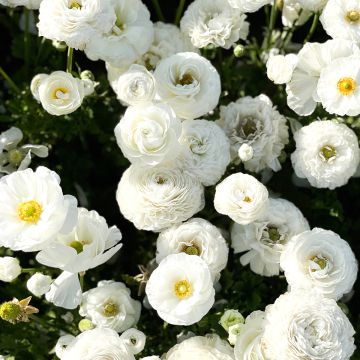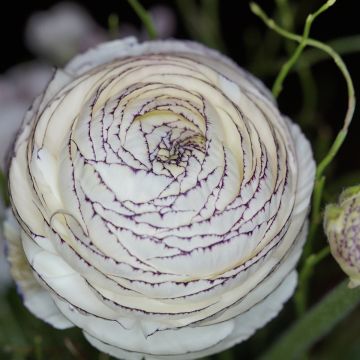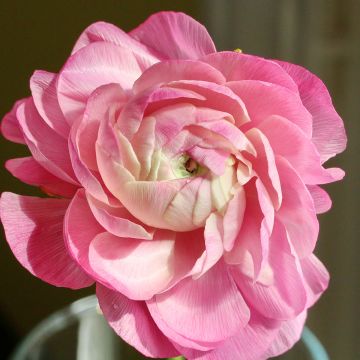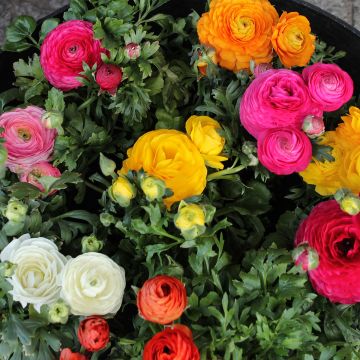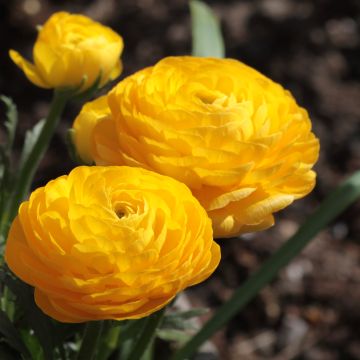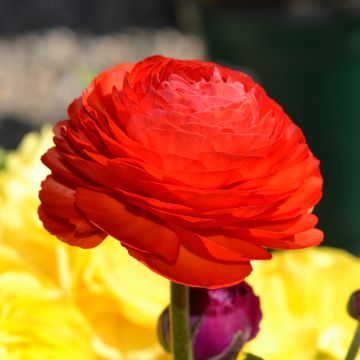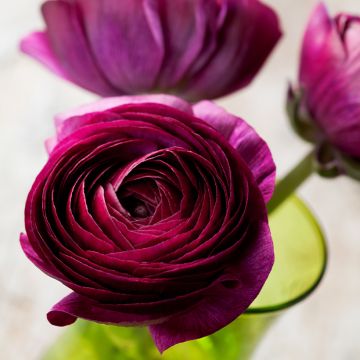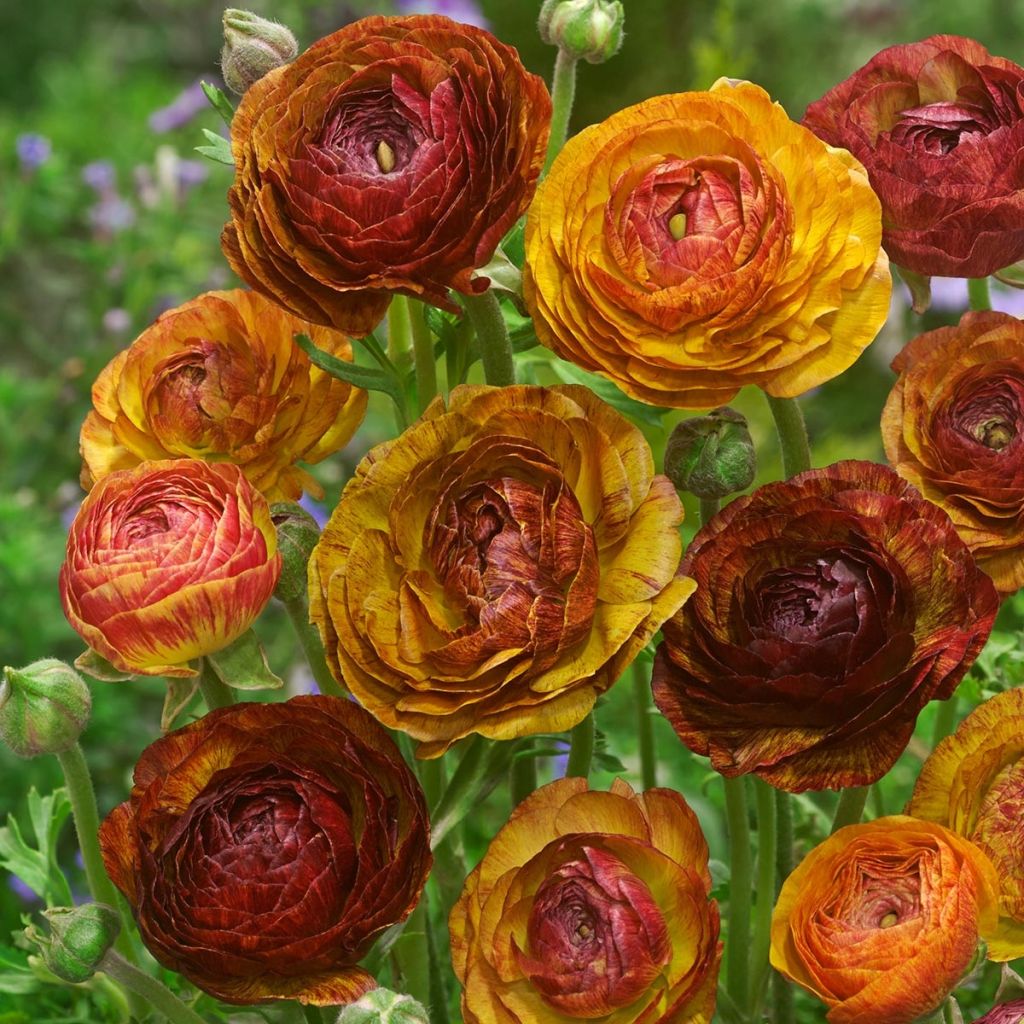

Renoncule asiatique Picotée Café au lait
Ranunculus asiaticus Picotée Café au lait - Persian Buttercup
Ranunculus x asiaticus Picotée Café au lait
Persian Buttercup, Asian Buttercup
Out of the ten young plants planted, only one flower bloomed this year.
Serge R., 09/05/2023
Why not try an alternative variety in stock?
View all →This plant carries a 6 months recovery warranty
More information
We guarantee the quality of our plants for a full growing cycle, and will replace at our expense any plant that fails to recover under normal climatic and planting conditions.
From €5.90 for pickup delivery and €6.90 for home delivery
Express home delivery from €8.90.
Does this plant fit my garden?
Set up your Plantfit profile →
Description
The Café au Lait Picotee Ranunculus is a variety of garden ranunculus, or florist ranunculus, that stands out from the rest; its double flowers blend different shades of gold, coffee, copper, and burnt orange on their petals. In a bouquet, its round flower and rich colour will work wonders. It can be planted in flower beds and borders as well as in pots where it will make a big impact. In mild climates, you can leave it in the ground and it will flower every year.
The Ranunculus asiaticus belongs to the buttercup family and is native to Asia and northeast Africa. It is a perennial herbaceous plant with a tuber shaped like small claws. This root is very durable and consists of several small elongated tubers, grouped together in a vascular bundle, which are sometimes called "claws." In colder regions, don't hesitate to store the tubers, similar to gladioli, to ensure you can enjoy them the following year. Not very hardy, it can withstand temperatures down to -7°C (19.4°F) at its lowest point. This ranunculus requires almost dry soil in winter. It has given rise to numerous cultivars with a wide range of colours, from pure white to various shades of pink, orange, red, and brown.
The foliage of the florist ranunculus emerges in spring. Its basal leaves form a rosette and measure 10 to 15 cm (4 to 6in) long. They are pale green to dark green and divided into three deep lobes. At maturity, this Asian ranunculus can reach a height of 40 cm (16in) when flowering, from which long flowering stems emerge, reaching 40 cm (16in) in height. 'Café au Lait Picotee' is a spring-flowering variety that is often grown under cover, in floristry, to speed up the production of its magnificent corollas. In May-June, each bulb produces up to 10 large, fully rounded flowers. These flowers measure 3 to 5 cm (1 to 2in) in diameter. At the top of each stem, a flower with tightly packed petals unfolds, forming a shimmering ball. The colour palette ranges from yellow to coffee brown, including all shades of orange.
The Asian ranunculus can be grown in flower beds, borders, rock gardens, and even in pots on a terrace. It is a highly ornamental plant that is also used in bouquets for its excellent vase life. It can be combined in floral arrangements with antique roses that match its colors so well, or even with modern roses with perfect forms in shades ranging from red to garnet, and all shades of yellow and orange.
Report an error about the product description
Plant habit
Flowering
Foliage
Botanical data
Ranunculus
x asiaticus
Picotée Café au lait
Ranunculaceae
Persian Buttercup, Asian Buttercup
Cultivar or hybrid
Other Ranunculus bulbs
Planting and care
Planting period
Intended location
Care
-
, onOrder confirmed
Reply from on Promesse de fleurs
Haven't found what you were looking for?
Hardiness is the lowest winter temperature a plant can endure without suffering serious damage or even dying. However, hardiness is affected by location (a sheltered area, such as a patio), protection (winter cover) and soil type (hardiness is improved by well-drained soil).

Photo Sharing Terms & Conditions
In order to encourage gardeners to interact and share their experiences, Promesse de fleurs offers various media enabling content to be uploaded onto its Site - in particular via the ‘Photo sharing’ module.
The User agrees to refrain from:
- Posting any content that is illegal, prejudicial, insulting, racist, inciteful to hatred, revisionist, contrary to public decency, that infringes on privacy or on the privacy rights of third parties, in particular the publicity rights of persons and goods, intellectual property rights, or the right to privacy.
- Submitting content on behalf of a third party;
- Impersonate the identity of a third party and/or publish any personal information about a third party;
In general, the User undertakes to refrain from any unethical behaviour.
All Content (in particular text, comments, files, images, photos, videos, creative works, etc.), which may be subject to property or intellectual property rights, image or other private rights, shall remain the property of the User, subject to the limited rights granted by the terms of the licence granted by Promesse de fleurs as stated below. Users are at liberty to publish or not to publish such Content on the Site, notably via the ‘Photo Sharing’ facility, and accept that this Content shall be made public and freely accessible, notably on the Internet.
Users further acknowledge, undertake to have ,and guarantee that they hold all necessary rights and permissions to publish such material on the Site, in particular with regard to the legislation in force pertaining to any privacy, property, intellectual property, image, or contractual rights, or rights of any other nature. By publishing such Content on the Site, Users acknowledge accepting full liability as publishers of the Content within the meaning of the law, and grant Promesse de fleurs, free of charge, an inclusive, worldwide licence for the said Content for the entire duration of its publication, including all reproduction, representation, up/downloading, displaying, performing, transmission, and storage rights.
Users also grant permission for their name to be linked to the Content and accept that this link may not always be made available.
By engaging in posting material, Users consent to their Content becoming automatically accessible on the Internet, in particular on other sites and/or blogs and/or web pages of the Promesse de fleurs site, including in particular social pages and the Promesse de fleurs catalogue.
Users may secure the removal of entrusted content free of charge by issuing a simple request via our contact form.
The flowering period indicated on our website applies to countries and regions located in USDA zone 8 (France, the United Kingdom, Ireland, the Netherlands, etc.)
It will vary according to where you live:
- In zones 9 to 10 (Italy, Spain, Greece, etc.), flowering will occur about 2 to 4 weeks earlier.
- In zones 6 to 7 (Germany, Poland, Slovenia, and lower mountainous regions), flowering will be delayed by 2 to 3 weeks.
- In zone 5 (Central Europe, Scandinavia), blooming will be delayed by 3 to 5 weeks.
In temperate climates, pruning of spring-flowering shrubs (forsythia, spireas, etc.) should be done just after flowering.
Pruning of summer-flowering shrubs (Indian Lilac, Perovskia, etc.) can be done in winter or spring.
In cold regions as well as with frost-sensitive plants, avoid pruning too early when severe frosts may still occur.
The planting period indicated on our website applies to countries and regions located in USDA zone 8 (France, United Kingdom, Ireland, Netherlands).
It will vary according to where you live:
- In Mediterranean zones (Marseille, Madrid, Milan, etc.), autumn and winter are the best planting periods.
- In continental zones (Strasbourg, Munich, Vienna, etc.), delay planting by 2 to 3 weeks in spring and bring it forward by 2 to 4 weeks in autumn.
- In mountainous regions (the Alps, Pyrenees, Carpathians, etc.), it is best to plant in late spring (May-June) or late summer (August-September).
The harvesting period indicated on our website applies to countries and regions in USDA zone 8 (France, England, Ireland, the Netherlands).
In colder areas (Scandinavia, Poland, Austria...) fruit and vegetable harvests are likely to be delayed by 3-4 weeks.
In warmer areas (Italy, Spain, Greece, etc.), harvesting will probably take place earlier, depending on weather conditions.
The sowing periods indicated on our website apply to countries and regions within USDA Zone 8 (France, UK, Ireland, Netherlands).
In colder areas (Scandinavia, Poland, Austria...), delay any outdoor sowing by 3-4 weeks, or sow under glass.
In warmer climes (Italy, Spain, Greece, etc.), bring outdoor sowing forward by a few weeks.

































